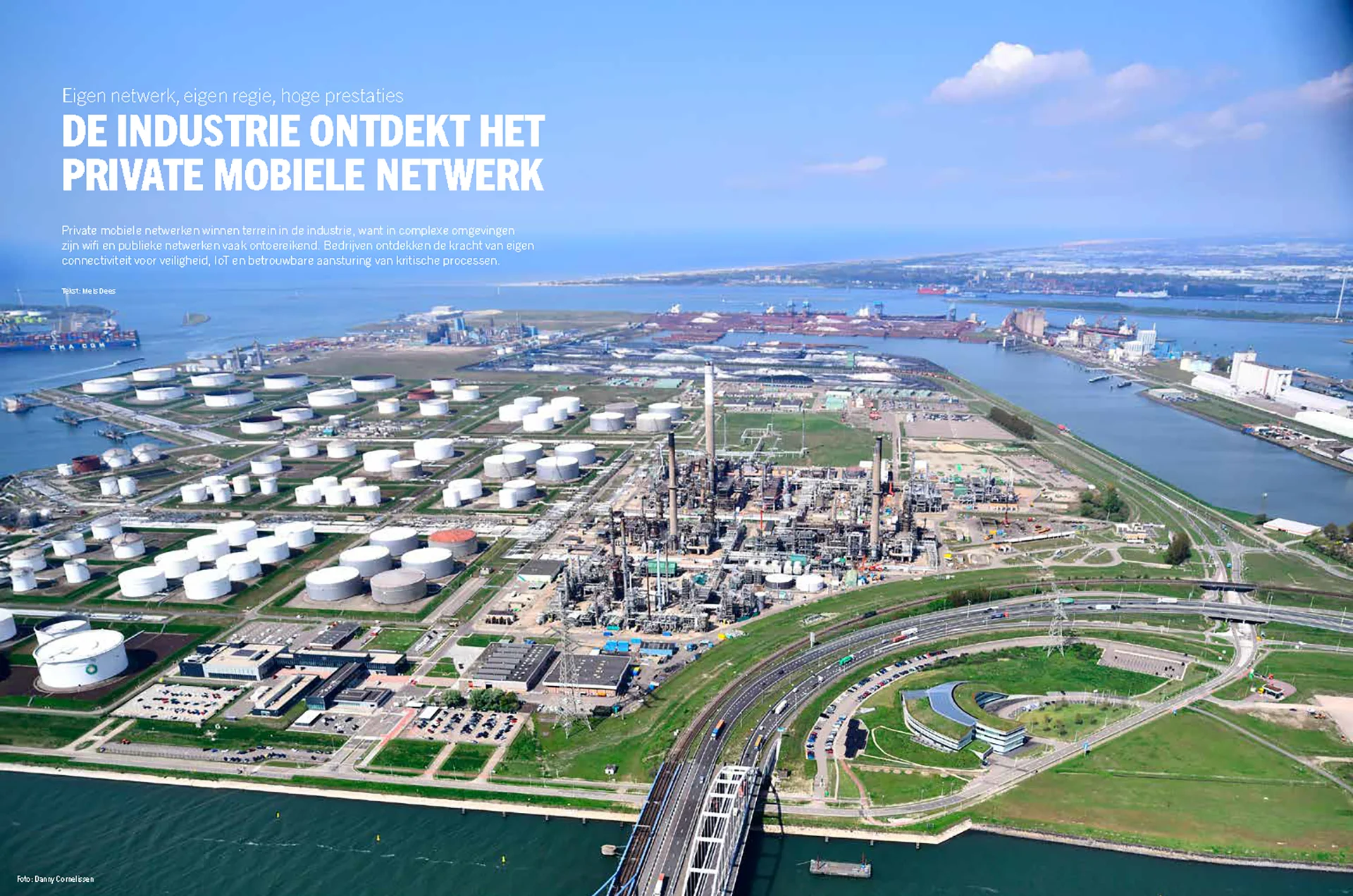Private network, full control, high performance
THE INDUSTRY IS DISCOVERING THE PRIVATE MOBILE NETWORK
Private mobile networks are gaining ground in industry, as Wi-Fi and public networks often fall short in complex environments. Companies are discovering the power of dedicated connectivity for safety, IoT, and reliable control of critical processes.
Original text by Mels Dees.
Translated article from Europoortkringen 0725 – Koen Mioulet PRIMMA 5G voor industrieen.
Without reliable wireless communication, an installation grinds to a halt—especially if it’s mobile. This is why the demand for stable, secure, and dependable connectivity is growing in the industrial sector. In complex environments such as ports, terminals, and chemical parks, wireless communication is increasingly a prerequisite for safe and efficient operations.
According to Koen Mioulet, consultant and secretary of EUWENA (European Users of Wireless Enterprise Networks Association), private networks such as private 4G and 5G are crucial to deliver that reliability. “Wi-Fi is not safe to use at all, and national mobile networks offer no guarantees. A private network does more or less the same as the familiar Wi-Fi, but far better, more secure, and with guaranteed performance.”
NETWORK PERFORMANCE
Guaranteed performance is essential in sectors where every minute of downtime brings major financial or safety risks. “In the Port of Rotterdam, there are many petrochemical companies. They increasingly rely on private networks—not just for voice, but especially for IoT, sensors, remote control, and data capture. Think of reading temperatures in storage tanks, automatically operating cranes, or tracking containers.”
A good example is the ECT container terminal, says Mioulet, where Wi-Fi was used for years to control cranes. “Those cranes would stop as soon as the signal dropped. That’s safe in itself—it’s better than continuing blindly—but it’s not workable. Sometimes someone had to go to the crane to manually restart a router. Eventually, they switched to a private LTE network years ago, which has made control much more robust and reliable.”
According to Mioulet, Wi-Fi is too limited for such applications. “Wi-Fi runs on shared spectrum, so it’s not reserved for your own use. You might have a good connection today, and none tomorrow because your neighbor consumes more bandwidth. That’s fine for office work, but disastrous for process and operational control.”
In the chemical industry, applications are just as critical. Mioulet: “If a sensor at a refinery detects that pressure in a pipe exceeds a critical threshold, that signal must always go through. You don’t want to take chances with that.”
THE POWER OF A DEDICATED NETWORK
Private networks offer full control and guaranteed performance (KPIs). Companies have their own radio system, core network, spectrum, and security. “No one can interfere with it. It’s your own infrastructure. You can shape, scale, and secure the performance entirely as you see fit,” says Mioulet.
In his presentations, he uses a model that plots mobility against connection reliability. “Wi-Fi sits in the bottom left: limited mobility and no guarantees. Mobile networks from national providers do offer mobility, but no SLAs. The large providers we all know do not offer uptime guarantees. Private networks combine both: full mobility and guaranteed availability. If properly configured, you can even achieve ‘five nines’ [99.999 percent] availability.”
That level of certainty is relevant to a wide range of applications—from voice communication to real-time data from pumps, valves, trucks, and robotics. “Some processes don’t need extremely high availability, like a temperature reading repeated every minute. But for a crane, an emergency button, or an automated guided vehicle, failure is not acceptable.”

APPLICATIONS IN PORTS AND CHEMICAL CLUSTERS
In port environments, the challenges are even greater, Mioulet explains. “These are radio-unfriendly environments filled with steel, water, concrete, and constantly changing configurations. One day you have coverage, the next day a stack of containers blocks it. Wi-Fi is very sensitive to that.”
Petrochemical clusters face similar obstacles. Sensors must remain operational even in metal-heavy installations or in ATEX zones that hinder wireless communication. Mioulet: “Private networks offer a solution here because you can optimize the infrastructure yourself for local conditions.”
Still, many port and chemical companies are uncertain. “Many only know Wi-Fi or assume that the national mobile network is sufficient. But those networks offer no guarantees. That doesn’t apply to so-called ‘slicing’, a new technique where national operators reserve a portion of their network for specific customers. In theory, this can offer high availability guarantees, for example for enterprise networks. But most operators don’t offer it widely as a service with such guarantees.”
According to Mioulet, this highlights a key difference between what’s technically possible and what’s actually offered: “Yes, technically, a lot is possible—even on national mobile networks. But the real question is: do you offer it with proper SLAs and guaranteed performance? Often, that’s not the case.”
"IF THE PORT AUTHORITY DOESN’T ACT, COMPANIES WILL HAVE TO DO IT THEMSELVES"
THE ROLE OF PORT AUTHORITIES
Within the PRIMMA program, in which Mioulet is active, the role of port authorities is a key area of focus. These authorities often remain cautious. “A traditional port authority manages quays and land. Network services are still seen as ‘risky’. But if you look at property managers in office buildings, they routinely provide Wi-Fi or indoor mobile coverage for tenants. So why shouldn’t a port authority also provide network capacity to tenants in the port?”
Some ports already do. “The Port of Valencia has deliberately chosen to deploy its own network and lease out that capacity. The Port of Belfast as well. But the Port of Rotterdam is still searching for its role and a fitting proposition, while companies like ECT, RWG and others have already taken matters into their own hands.”
The consequence is clear: “If the port authority does nothing, companies will have to act themselves. Large players among the 3,000 businesses in the port, such as BP or ECT, can handle it. But for the 2,900 smaller tenants, that’s often not feasible. They lack the personnel or expertise to apply for spectrum or manage vendors.”
One major hurdle in rolling out private networks is the complexity surrounding spectrum. “To operate a private network, you need spectrum. That’s the radio frequency you’re allowed to transmit on.” Mioulet points out a challenge here, as each European country handles this differently. “The UK, Belgium, and Germany all use different frequencies. That makes things difficult for companies operating across multiple countries. You have to apply separately in each country, retune your equipment, and sometimes even switch to a different supplier.”
The EU is now trying to standardize this using the 3.8–4.2 GHz band, but that process is slow. “The Netherlands is lagging behind. We’re still consulting and talking, but companies need a solution now. They can’t wait for Brussels’ regulatory machine to finish.”
“WE WANT TO ACCELERATE THE MARKET, NOT JUST FOR THE FRONT-RUNNERS, BUT FOR THE ENTIRE INDUSTRIAL ECOSYSTEM”
OUTSOURCING
The technical solutions are available. Suppliers like Nokia, Ericsson, Airspan, Druid, and many other manufacturers offer radios, core networks, software, and end-user equipment. Dutch companies are also developing routers that, for example, automatically switch between providers. “You can choose to manage everything yourself, or to outsource it entirely to a specialized system integrator. There are real options,” Mioulet emphasizes.
His message to industrial companies is clear: “Start by asking yourself: how critical is your communication? Is Wi-Fi really sufficient? Or is there an application that requires guaranteed connectivity? Then explore what a private network can offer you. And if you don’t have an in-house IT department, get support from an integrator.”
According to Mioulet, mid-sized companies are currently the biggest bottleneck. “The big players like BASF or Hutchison know their way around. Small companies often do nothing. But there’s a large middle segment that does need this but doesn’t know how to get started. They realize it’s valuable, but fear the complexity. So it ends up being postponed.”
That’s what his PRIMMA program aims to change, through whitepapers, workshops, presentations, and advisory services. Mioulet: “We want to accelerate the market—not just for the front-runners, but for the entire industrial ecosystem. So that even a company with a hundred employees can access reliable, secure, and future-proof wireless connectivity.”

